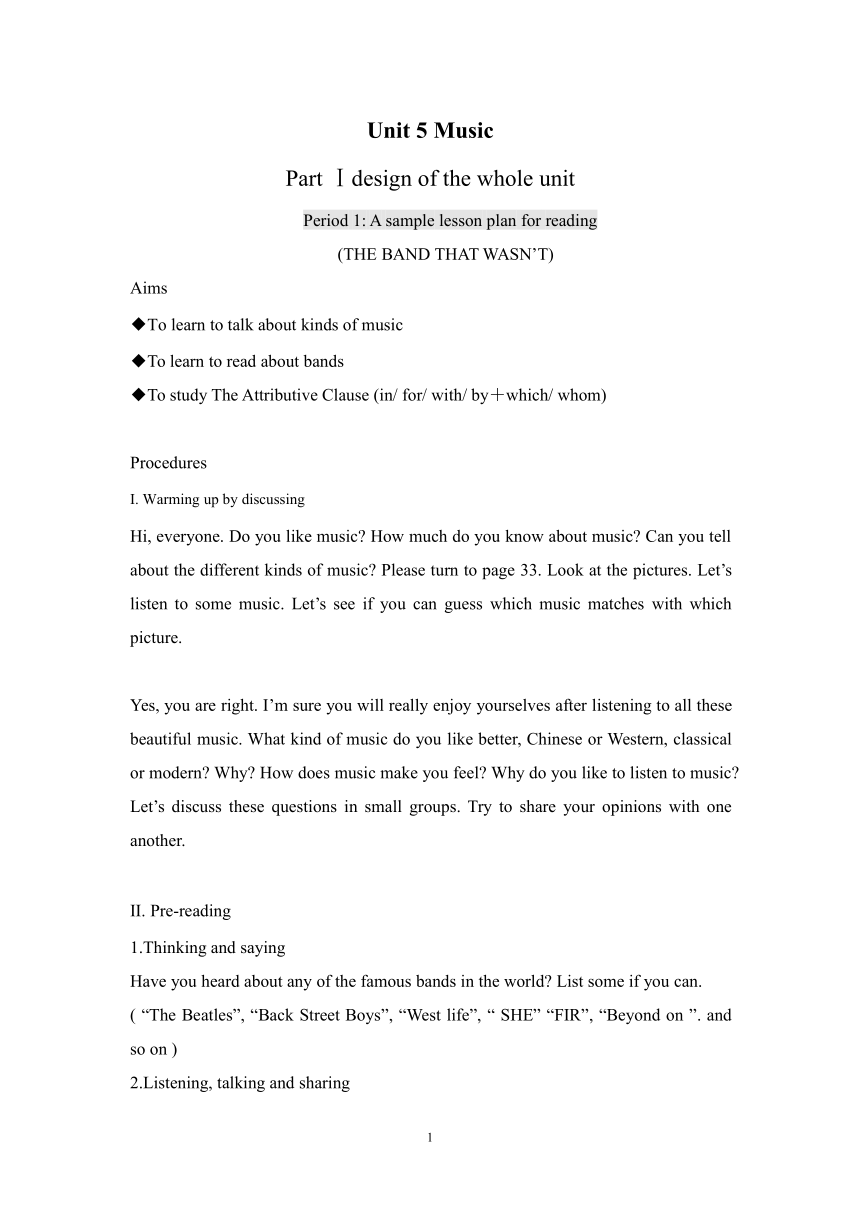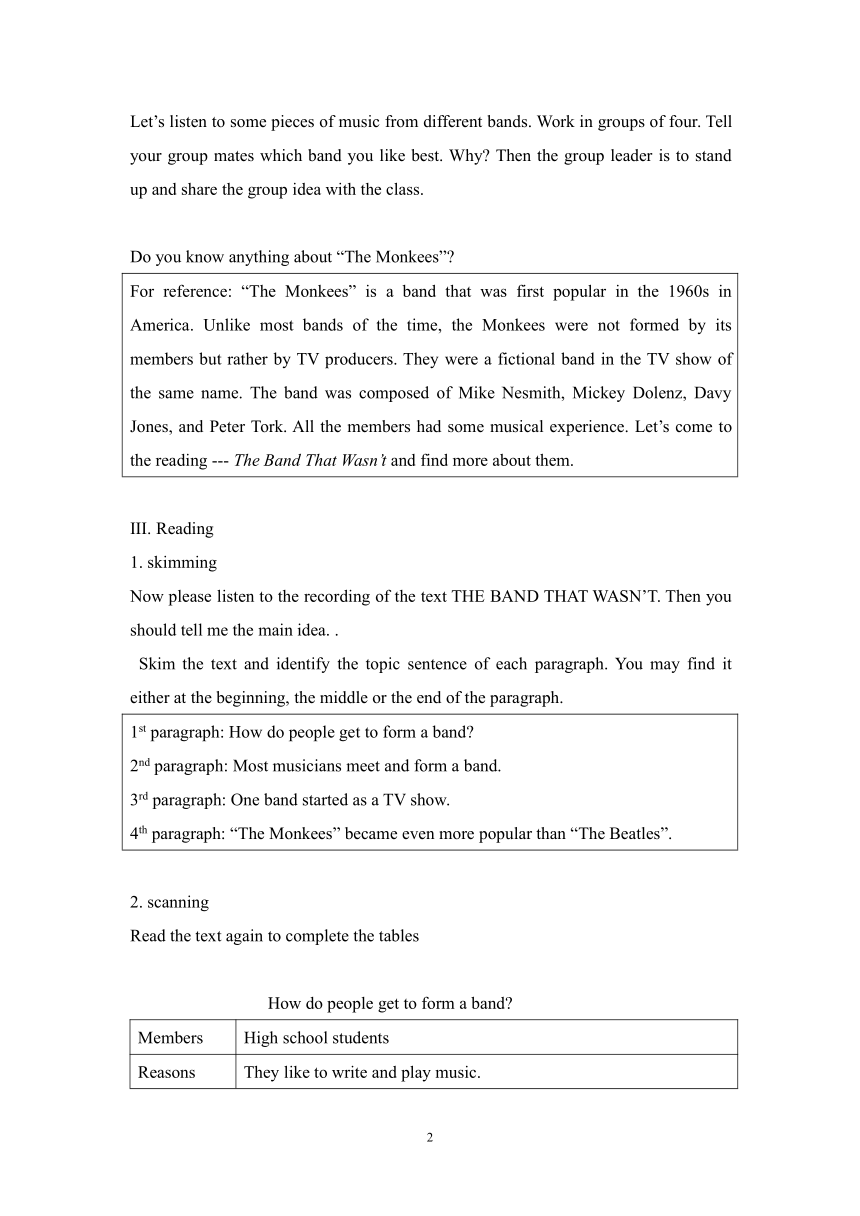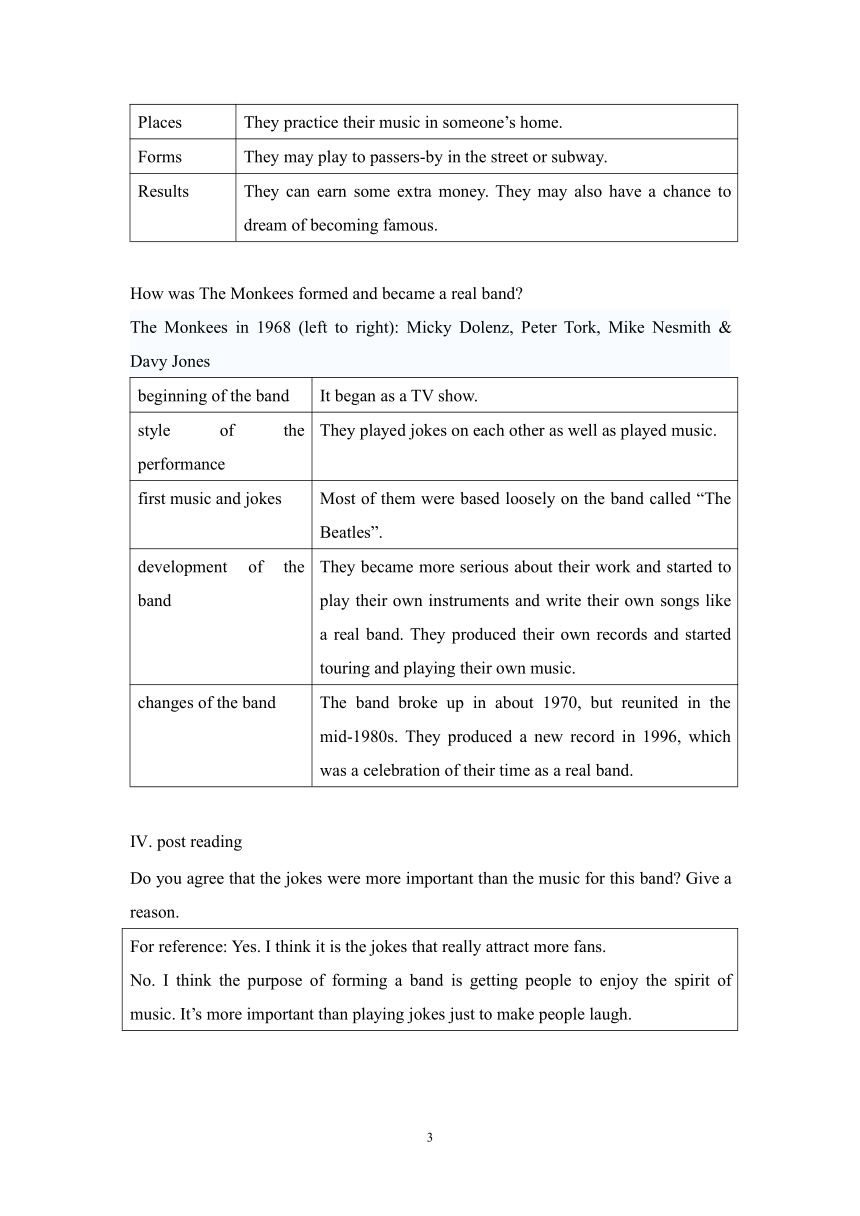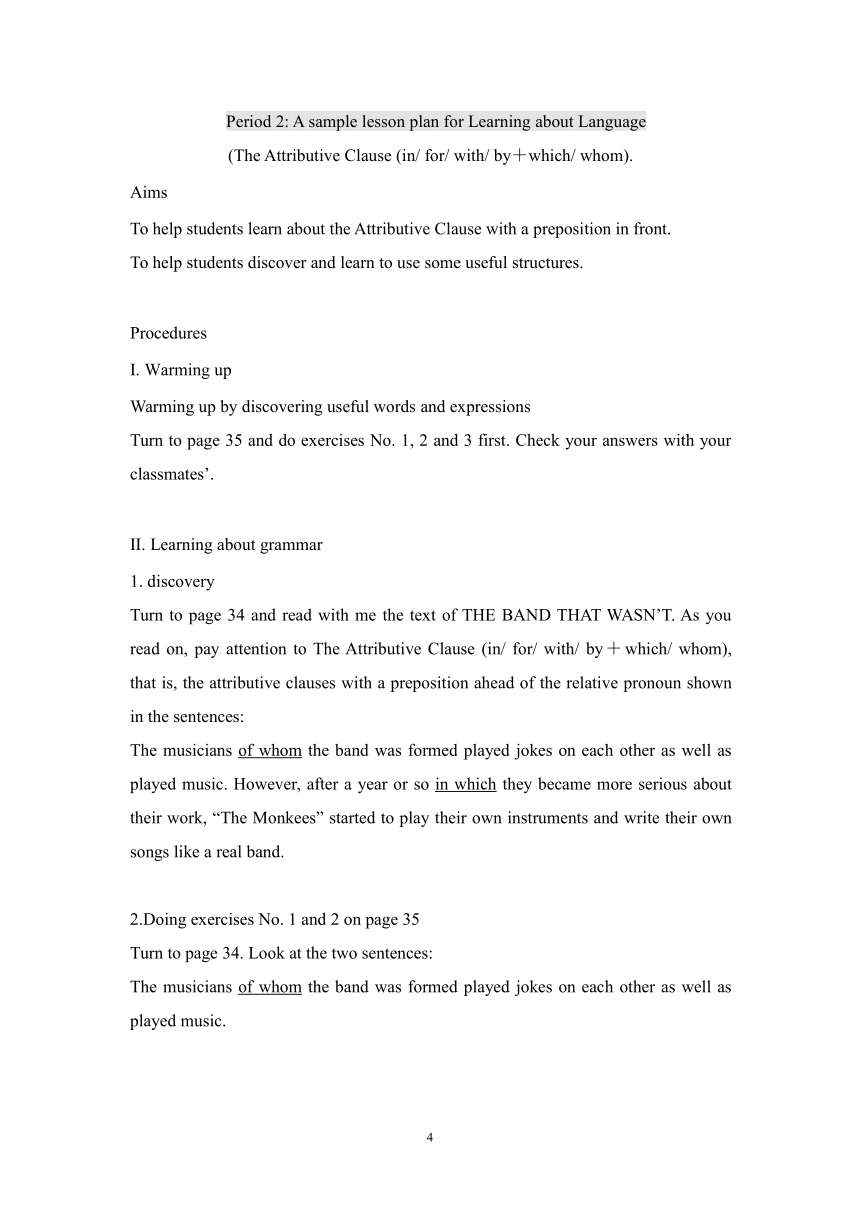module2 unit5 music整单元的教案[上学期]
文档属性
| 名称 | module2 unit5 music整单元的教案[上学期] |

|
|
| 格式 | rar | ||
| 文件大小 | 14.8KB | ||
| 资源类型 | 教案 | ||
| 版本资源 | 人教版(新课程标准) | ||
| 科目 | 英语 | ||
| 更新时间 | 2006-11-16 00:00:00 | ||
图片预览




文档简介
Unit 5 Music
Part Ⅰdesign of the whole unit
Period 1: A sample lesson plan for reading
(THE BAND THAT WASN’T)
Aims
◆To learn to talk about kinds of music
◆To learn to read about bands
◆To study The Attributive Clause (in/ for/ with/ by+which/ whom)
Procedures
I. Warming up by discussing
Hi, everyone. Do you like music How much do you know about music Can you tell about the different kinds of music Please turn to page 33. Look at the pictures. Let’s listen to some music. Let’s see if you can guess which music matches with which picture.
Yes, you are right. I’m sure you will really enjoy yourselves after listening to all these beautiful music. What kind of music do you like better, Chinese or Western, classical or modern Why How does music make you feel Why do you like to listen to music Let’s discuss these questions in small groups. Try to share your opinions with one another.
II. Pre-reading
1.Thinking and saying
Have you heard about any of the famous bands in the world List some if you can.
( “The Beatles”, “Back Street Boys”, “West life”, “ SHE” “FIR”, “Beyond on ”. and so on )
2.Listening, talking and sharing
Let’s listen to some pieces of music from different bands. Work in groups of four. Tell your group mates which band you like best. Why Then the group leader is to stand up and share the group idea with the class.
Do you know anything about “The Monkees”
For reference: “The Monkees” is a band that was first popular in the 1960s in America. Unlike most bands of the time, the Monkees were not formed by its members but rather by TV producers. They were a fictional band in the TV show of the same name. The band was composed of Mike Nesmith, Mickey Dolenz, Davy Jones, and Peter Tork. All the members had some musical experience. Let’s come to the reading --- The Band That Wasn’t and find more about them.
III. Reading
1. skimming
Now please listen to the recording of the text THE BAND THAT WASN’T. Then you should tell me the main idea. .
Skim the text and identify the topic sentence of each paragraph. You may find it either at the beginning, the middle or the end of the paragraph.
1st paragraph: How do people get to form a band 2nd paragraph: Most musicians meet and form a band. 3rd paragraph: One band started as a TV show.4th paragraph: “The Monkees” became even more popular than “The Beatles”.
2. scanning
Read the text again to complete the tables
How do people get to form a band
Members High school students
Reasons They like to write and play music.
Places They practice their music in someone’s home.
Forms They may play to passers-by in the street or subway.
Results They can earn some extra money. They may also have a chance to dream of becoming famous.
How was The Monkees formed and became a real band ( file: / / / D:\\wiki\\Image:4kees.jpg )
The Monkees in 1968 (left to right): Micky Dolenz, Peter Tork, Mike Nesmith & Davy Jones
beginning of the band It began as a TV show.
style of the performance They played jokes on each other as well as played music.
first music and jokes Most of them were based loosely on the band called “The Beatles”.
development of the band They became more serious about their work and started to play their own instruments and write their own songs like a real band. They produced their own records and started touring and playing their own music.
changes of the band The band broke up in about 1970, but reunited in the mid-1980s. They produced a new record in 1996, which was a celebration of their time as a real band.
IV. post reading
Do you agree that the jokes were more important than the music for this band Give a reason.
For reference: Yes. I think it is the jokes that really attract more fans.No. I think the purpose of forming a band is getting people to enjoy the spirit of music. It’s more important than playing jokes just to make people laugh.
Period 2: A sample lesson plan for Learning about Language
(The Attributive Clause (in/ for/ with/ by+which/ whom).
Aims
To help students learn about the Attributive Clause with a preposition in front.
To help students discover and learn to use some useful structures.
Procedures
I. Warming up
Warming up by discovering useful words and expressions
Turn to page 35 and do exercises No. 1, 2 and 3 first. Check your answers with your classmates’.
II. Learning about grammar
1. discovery
Turn to page 34 and read with me the text of THE BAND THAT WASN’T. As you read on, pay attention to The Attributive Clause (in/ for/ with/ by+which/ whom), that is, the attributive clauses with a preposition ahead of the relative pronoun shown in the sentences:
The musicians of whom the band was formed played jokes on each other as well as played music. However, after a year or so in which they became more serious about their work, “The Monkees” started to play their own instruments and write their own songs like a real band.
2.Doing exercises No. 1 and 2 on page 35
Turn to page 34. Look at the two sentences:
The musicians of whom the band was formed played jokes on each other as well as played music.
However, after a year or so in which they became more serious about their work, “The Monkees” started to play their own instruments and write their own songs like a real band.
Now go on to do Exercise No. 2 on page 36, that is, to sort out the sentences.
Period 3: A sample lesson plan for Using Language
Aims
To read the story about Freddy and then enjoy and understand Beatles’ songs.
To use the language by reading, listening, speaking and writing.
Procedures
I. Warming up by listening and writing
Turn to page 37 and read these sentences before listening to the tape. Then listen to the tape and decide true or false.
II. Guided reading
1. Reading and underlining
You are to read and underline all the useful expressions or collocations in the passage. Copy them to your notebook after class as homework.
1. Doing exercises
Now you are going to do exercises No. 3, 4 and 5 on page 38 following the article.
Ex3: Here are the incorrect sentences which should be crossed out.
1. Freddy and his band always loved being pop stars.
1. His favorite program was “Top of the Pops”.
1. Things went wrong because Freddy and his band hid themselves.
1. They realized they had to go because they were painful.
Exercise 4 Answer these questions:
1. This is an open question by which students are asked about their opinions.
Answers may vary.
1. Answers may vary but there is information in the reading passage that may include:
--- becoming rich;
--- doing a job you want to do;
--- having many fans;
--- people enjoying your music.
1. Answers may vary but information may include:
--- peaceful and quiet;
--- a private life away from crowds;
--- a personal life which others do not discuss.
Exercise 5: The main idea is No. 3. This is a story about a band that became famous and did not like it. Only No. 3 best summarizes the main idea, while all the others reflect just part of the main idea. At first, Freddy and his band wanted to be famous, but when he became famous, they were always being followed wherever they went, which they found painful.
III. Guided writing
1.Writing a letter for advice
Please turn to page 38 writing. Let’s read the instructions.
You’d better do some brainstorming in small groups before writing your letters. You should follow the procedure for brainstorming and outlining introduced in Module 1 Unit 2.
Writing tips:In groups discuss some questions you would like to ask Freddy.Make a list of them.Use each question to start a new paragraph.Write your question first; then add extra information to show Freddy why you need help.Finish the letter politely and thank Freddy for his help.
2.Reading Freddy’s reply
Let’s read Freddy’s reply and answer the questions:
--- How was Freddy’s band formed
--- What advice does Freddy give
3.Writing a note and a paragraph
Please turn to page 74. Now in pairs you are going to decide on the best way to tell a foreign friend about one kind of Chinese folk music. What do you think they need to know before they can enjoy it Why do you like it Who are your favorite singers Discuss it with your partner and write notes to remind you of your most important ideas. Then write a paragraph telling your foreign friend about the type of Chinese folk music you have chosen. Use a dictionary and other reference books to help you.
IV. Homework
Finding information
Go to the library to read or get online to search in order to find more information on music and musicians. Take notes of your findings and report them to your group mates next class.
Part Two: Teaching Resources
Words and expressions from Unit 5 THE BAND THAT WASN’T
I. Words and expressions of Reading
classical
adj. (of music)put together and arranged(composed) with serious artistic intentions; having an attraction that lasts over a long period of time(as opposed to popular or folk music)(音乐)古典的
eg I like classical music.
roll
vt.&vi. 1. to (cause to) move along by turning over and over(使)滚动
eg. We rolled the barrels of oil onto the ship.
2. to move steadily and smoothly along(as) on wheels(车轮)滚动;转动
eg. The waves rolled over the sand.
3. (of a ship)to swing from side to side with the movement of the waves摇摆;摇晃The ship rolled so heavily that we were all sick
folk
adj. of, connected with, or being music or any other art that has grown up among working and/or country people as an important part of their way of living and belongs to a particular area, trade, etc., or that has been made in modern times as a copy of this(音乐;艺术)民间的;民俗的
eg. folk music/ folk songs/ Chinese folk art/ give a folk concert/a folk singer
dream
n. 1. a group of thoughts, images, or feelings experienced during sleep梦 2. sth. imaged, not real, but believed in or greatly and hopefully desired理想;梦想
v.梦见;梦想dream of/about (doing) sth./ dream a dream
eg. I dream a dream that I am super star.
I dream of/about being a super star.
be honest with = be frank with/ to tell you the truth
eg. I want you to be honest with me.
form
vt.&n.(使)组成;形成form some ideas or opinion about sth
eg. Our class is formed by 56 students.
passer-by n. 过路人;行人passers-by ( 复数形式)
earn
vt. 1. to get (money) by working赚;挣(钱)
eg. He earns $3,000 per month.
1. to get(sth. that one deserves)because of one’s qualities博得;赢得
eg. He earned the name of “The Great Hero” by his braveness in the war.
loosely adv. 宽松的;松散的loosely speaking/ loosely translated
actor n. 男演员;行动者actor and actress/ an excellent actor
attractive
adj. having the power to attract有吸引力的
eg. The advertisement is very attractive.
fan
n. 1. 扇子turn the fan on
2. a very keen follower or supporter, as of a sport, performing art, or famous person迷;狂热者fan club
instrument
n. 工具;器械;乐器play an instrument/ the instruments of the orchestra/ a ship’s instruments
PAGE
9
Part Ⅰdesign of the whole unit
Period 1: A sample lesson plan for reading
(THE BAND THAT WASN’T)
Aims
◆To learn to talk about kinds of music
◆To learn to read about bands
◆To study The Attributive Clause (in/ for/ with/ by+which/ whom)
Procedures
I. Warming up by discussing
Hi, everyone. Do you like music How much do you know about music Can you tell about the different kinds of music Please turn to page 33. Look at the pictures. Let’s listen to some music. Let’s see if you can guess which music matches with which picture.
Yes, you are right. I’m sure you will really enjoy yourselves after listening to all these beautiful music. What kind of music do you like better, Chinese or Western, classical or modern Why How does music make you feel Why do you like to listen to music Let’s discuss these questions in small groups. Try to share your opinions with one another.
II. Pre-reading
1.Thinking and saying
Have you heard about any of the famous bands in the world List some if you can.
( “The Beatles”, “Back Street Boys”, “West life”, “ SHE” “FIR”, “Beyond on ”. and so on )
2.Listening, talking and sharing
Let’s listen to some pieces of music from different bands. Work in groups of four. Tell your group mates which band you like best. Why Then the group leader is to stand up and share the group idea with the class.
Do you know anything about “The Monkees”
For reference: “The Monkees” is a band that was first popular in the 1960s in America. Unlike most bands of the time, the Monkees were not formed by its members but rather by TV producers. They were a fictional band in the TV show of the same name. The band was composed of Mike Nesmith, Mickey Dolenz, Davy Jones, and Peter Tork. All the members had some musical experience. Let’s come to the reading --- The Band That Wasn’t and find more about them.
III. Reading
1. skimming
Now please listen to the recording of the text THE BAND THAT WASN’T. Then you should tell me the main idea. .
Skim the text and identify the topic sentence of each paragraph. You may find it either at the beginning, the middle or the end of the paragraph.
1st paragraph: How do people get to form a band 2nd paragraph: Most musicians meet and form a band. 3rd paragraph: One band started as a TV show.4th paragraph: “The Monkees” became even more popular than “The Beatles”.
2. scanning
Read the text again to complete the tables
How do people get to form a band
Members High school students
Reasons They like to write and play music.
Places They practice their music in someone’s home.
Forms They may play to passers-by in the street or subway.
Results They can earn some extra money. They may also have a chance to dream of becoming famous.
How was The Monkees formed and became a real band ( file: / / / D:\\wiki\\Image:4kees.jpg )
The Monkees in 1968 (left to right): Micky Dolenz, Peter Tork, Mike Nesmith & Davy Jones
beginning of the band It began as a TV show.
style of the performance They played jokes on each other as well as played music.
first music and jokes Most of them were based loosely on the band called “The Beatles”.
development of the band They became more serious about their work and started to play their own instruments and write their own songs like a real band. They produced their own records and started touring and playing their own music.
changes of the band The band broke up in about 1970, but reunited in the mid-1980s. They produced a new record in 1996, which was a celebration of their time as a real band.
IV. post reading
Do you agree that the jokes were more important than the music for this band Give a reason.
For reference: Yes. I think it is the jokes that really attract more fans.No. I think the purpose of forming a band is getting people to enjoy the spirit of music. It’s more important than playing jokes just to make people laugh.
Period 2: A sample lesson plan for Learning about Language
(The Attributive Clause (in/ for/ with/ by+which/ whom).
Aims
To help students learn about the Attributive Clause with a preposition in front.
To help students discover and learn to use some useful structures.
Procedures
I. Warming up
Warming up by discovering useful words and expressions
Turn to page 35 and do exercises No. 1, 2 and 3 first. Check your answers with your classmates’.
II. Learning about grammar
1. discovery
Turn to page 34 and read with me the text of THE BAND THAT WASN’T. As you read on, pay attention to The Attributive Clause (in/ for/ with/ by+which/ whom), that is, the attributive clauses with a preposition ahead of the relative pronoun shown in the sentences:
The musicians of whom the band was formed played jokes on each other as well as played music. However, after a year or so in which they became more serious about their work, “The Monkees” started to play their own instruments and write their own songs like a real band.
2.Doing exercises No. 1 and 2 on page 35
Turn to page 34. Look at the two sentences:
The musicians of whom the band was formed played jokes on each other as well as played music.
However, after a year or so in which they became more serious about their work, “The Monkees” started to play their own instruments and write their own songs like a real band.
Now go on to do Exercise No. 2 on page 36, that is, to sort out the sentences.
Period 3: A sample lesson plan for Using Language
Aims
To read the story about Freddy and then enjoy and understand Beatles’ songs.
To use the language by reading, listening, speaking and writing.
Procedures
I. Warming up by listening and writing
Turn to page 37 and read these sentences before listening to the tape. Then listen to the tape and decide true or false.
II. Guided reading
1. Reading and underlining
You are to read and underline all the useful expressions or collocations in the passage. Copy them to your notebook after class as homework.
1. Doing exercises
Now you are going to do exercises No. 3, 4 and 5 on page 38 following the article.
Ex3: Here are the incorrect sentences which should be crossed out.
1. Freddy and his band always loved being pop stars.
1. His favorite program was “Top of the Pops”.
1. Things went wrong because Freddy and his band hid themselves.
1. They realized they had to go because they were painful.
Exercise 4 Answer these questions:
1. This is an open question by which students are asked about their opinions.
Answers may vary.
1. Answers may vary but there is information in the reading passage that may include:
--- becoming rich;
--- doing a job you want to do;
--- having many fans;
--- people enjoying your music.
1. Answers may vary but information may include:
--- peaceful and quiet;
--- a private life away from crowds;
--- a personal life which others do not discuss.
Exercise 5: The main idea is No. 3. This is a story about a band that became famous and did not like it. Only No. 3 best summarizes the main idea, while all the others reflect just part of the main idea. At first, Freddy and his band wanted to be famous, but when he became famous, they were always being followed wherever they went, which they found painful.
III. Guided writing
1.Writing a letter for advice
Please turn to page 38 writing. Let’s read the instructions.
You’d better do some brainstorming in small groups before writing your letters. You should follow the procedure for brainstorming and outlining introduced in Module 1 Unit 2.
Writing tips:In groups discuss some questions you would like to ask Freddy.Make a list of them.Use each question to start a new paragraph.Write your question first; then add extra information to show Freddy why you need help.Finish the letter politely and thank Freddy for his help.
2.Reading Freddy’s reply
Let’s read Freddy’s reply and answer the questions:
--- How was Freddy’s band formed
--- What advice does Freddy give
3.Writing a note and a paragraph
Please turn to page 74. Now in pairs you are going to decide on the best way to tell a foreign friend about one kind of Chinese folk music. What do you think they need to know before they can enjoy it Why do you like it Who are your favorite singers Discuss it with your partner and write notes to remind you of your most important ideas. Then write a paragraph telling your foreign friend about the type of Chinese folk music you have chosen. Use a dictionary and other reference books to help you.
IV. Homework
Finding information
Go to the library to read or get online to search in order to find more information on music and musicians. Take notes of your findings and report them to your group mates next class.
Part Two: Teaching Resources
Words and expressions from Unit 5 THE BAND THAT WASN’T
I. Words and expressions of Reading
classical
adj. (of music)put together and arranged(composed) with serious artistic intentions; having an attraction that lasts over a long period of time(as opposed to popular or folk music)(音乐)古典的
eg I like classical music.
roll
vt.&vi. 1. to (cause to) move along by turning over and over(使)滚动
eg. We rolled the barrels of oil onto the ship.
2. to move steadily and smoothly along(as) on wheels(车轮)滚动;转动
eg. The waves rolled over the sand.
3. (of a ship)to swing from side to side with the movement of the waves摇摆;摇晃The ship rolled so heavily that we were all sick
folk
adj. of, connected with, or being music or any other art that has grown up among working and/or country people as an important part of their way of living and belongs to a particular area, trade, etc., or that has been made in modern times as a copy of this(音乐;艺术)民间的;民俗的
eg. folk music/ folk songs/ Chinese folk art/ give a folk concert/a folk singer
dream
n. 1. a group of thoughts, images, or feelings experienced during sleep梦 2. sth. imaged, not real, but believed in or greatly and hopefully desired理想;梦想
v.梦见;梦想dream of/about (doing) sth./ dream a dream
eg. I dream a dream that I am super star.
I dream of/about being a super star.
be honest with = be frank with/ to tell you the truth
eg. I want you to be honest with me.
form
vt.&n.(使)组成;形成form some ideas or opinion about sth
eg. Our class is formed by 56 students.
passer-by n. 过路人;行人passers-by ( 复数形式)
earn
vt. 1. to get (money) by working赚;挣(钱)
eg. He earns $3,000 per month.
1. to get(sth. that one deserves)because of one’s qualities博得;赢得
eg. He earned the name of “The Great Hero” by his braveness in the war.
loosely adv. 宽松的;松散的loosely speaking/ loosely translated
actor n. 男演员;行动者actor and actress/ an excellent actor
attractive
adj. having the power to attract有吸引力的
eg. The advertisement is very attractive.
fan
n. 1. 扇子turn the fan on
2. a very keen follower or supporter, as of a sport, performing art, or famous person迷;狂热者fan club
instrument
n. 工具;器械;乐器play an instrument/ the instruments of the orchestra/ a ship’s instruments
PAGE
9
